20+ Herbal Tea Types And Their Health Benefits
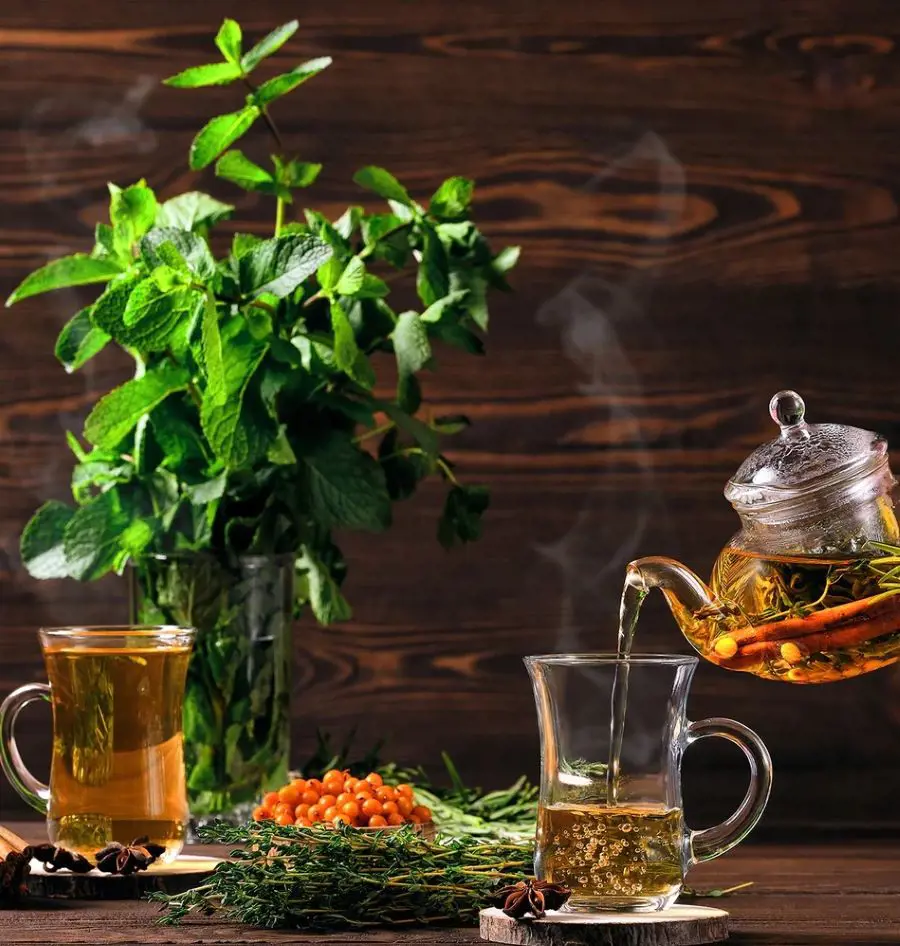
This post may contain affiliate links. If you make a purchase through links on our site, we may earn a commission.
The most common herbal tea ingredients include herbs and spices like ginger, peppermint, turmeric, lavender, and cinnamon, among others.
Unlike traditional teas made from the leaves of the Camellia Sinensis plant, herbal teas derive their aromatic essence from dried fruits, fragrant flowers, spices, and herbs.
These teas not only taste great but also offer numerous health benefits, as they have been used as natural remedies for a wide range of ailments for centuries. Below, we present an enticing selection of over 20 healthy herbal teas for you to explore and savor.
1. Ginger Herbal Tea
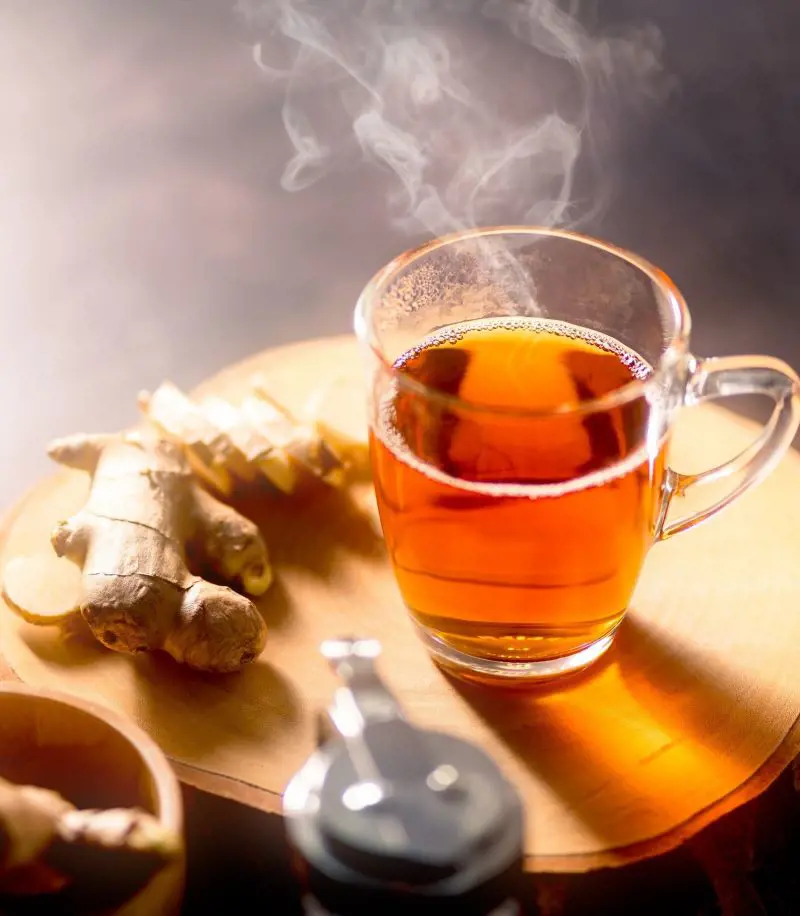
The ultimate aromatic ginger is wonderful fresh, dried, pickled, candied, and in many other forms. A sip of this healthy tea is enough to beat the cold shivers. A rich source of vitamin C, magnesium, and other essential mineral, ginger tea is used as an herbal remedy for a wide variety of ailments.
This spicy, sweet, and fragrant root brings an irresistible zing to many smoothies, soups, and stir-fries. Ginger, in its powdered form, is an essential addition to desserts like gingersnap cookies and pumpkin pie.
Health benefits:
- Relieves nausea or motion sickness
- Helps manage blood sugar
- Beneficial for your heart
- Alleviate congestion caused by cold
- Helps prevent stomach ulcer
2. Chamomile Herbal Tea
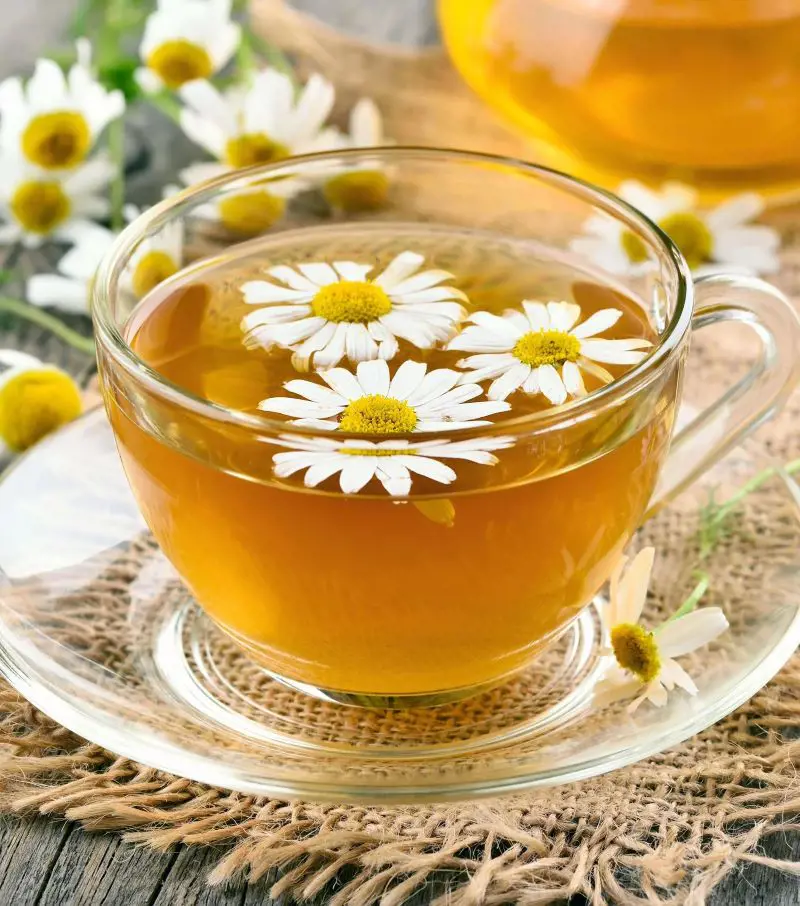
Chamomile herbal tea has a gentle, soothing flavor, making it an ideal bedtime drink. This tea comes from chamomile flowers, which can be steeped in hot water when fresh. To enjoy chamomile tea year-round, consider drying and storing them in an airtight container.
Unlike many other flower-based tisanes, chamomile doesn't possess an overly floral flavor. Instead, it offers a naturally sweet blend with hints of hay and honey. Rich in flavonoids, it is caffeine-free and offers potential health and skin benefits.
Health benefits:
- Improves sleep quality
- Antibacterial, anti-inflammatory, and liver-protecting properties
- Improve blood sugar control
- Promotes healthy digestion
- Soothes cold
- Good for your heart
3. Hibiscus Herbal Tea
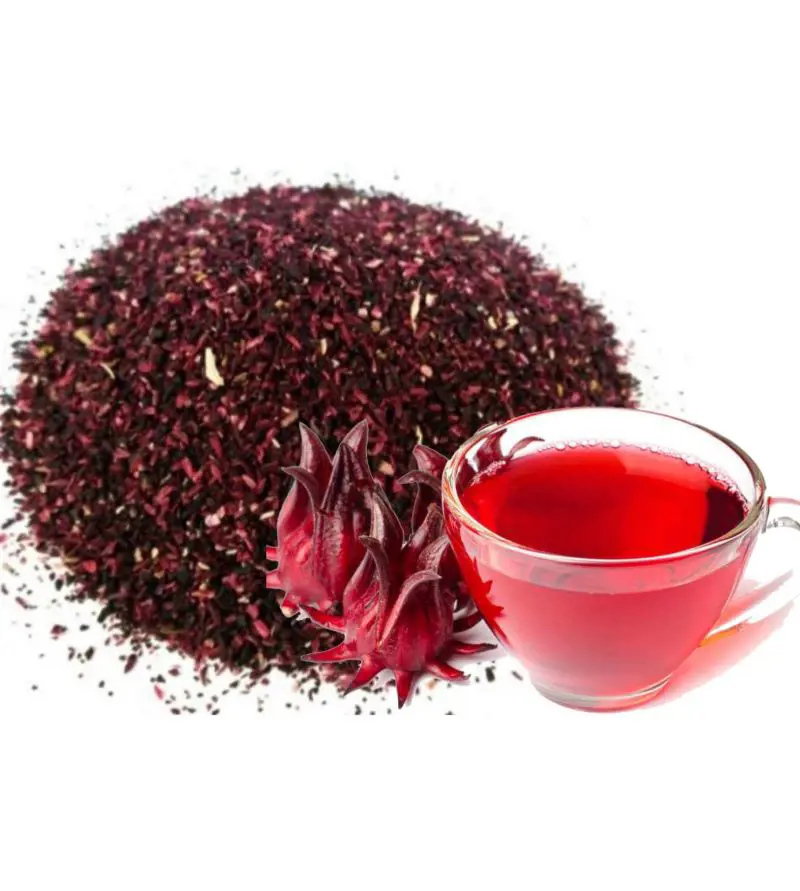
Hibiscus herbal tea is widely known for its bold color and unique flavor. This cranberry-like tea is enjoyed all around the world, including in Mexico, Central America, West Africa, India, Cambodia, Persia, and more. Hibiscus tea can be savored by itself or used as an ingredient in various tea blends.
This refreshing drink is often preferred as iced tea but can also be enjoyed piping hot. It's typically prepared by mixing hibiscus tea with lemon juice and sugar, resulting in a sweet and enticing drink.
Health benefits:
- Reduce LDL (bad) cholesterol
- High in antioxidants
- Decrease oxidative stress
- Antibacterial and antimicrobial properties
- Rich source of vitamin C
4. Ashwagandha Herbal Tea

Ashwagandha is a nontoxic herb known for its ability to modulate stress and anxiety. It's often found in a blend of herbal ingredients, as the strong and bitter flavor of the herb can be overwhelming by itself. Taking ashwagandha tea is considered the best way to introduce the herb into your diet gently.
In addition, ashwagandha can also be ingested as powders, tinctures, and supplements, or in their natural raw forms.
Health benefits:
- Relieves stress and anxiety
- Increases muscle and strength
- Boosts fertility and testosterone levels in men
- Sharpens focus and memory
- Promotes heart health
- Lowers blood sugar and fat
5. Lavender Herbal Tea
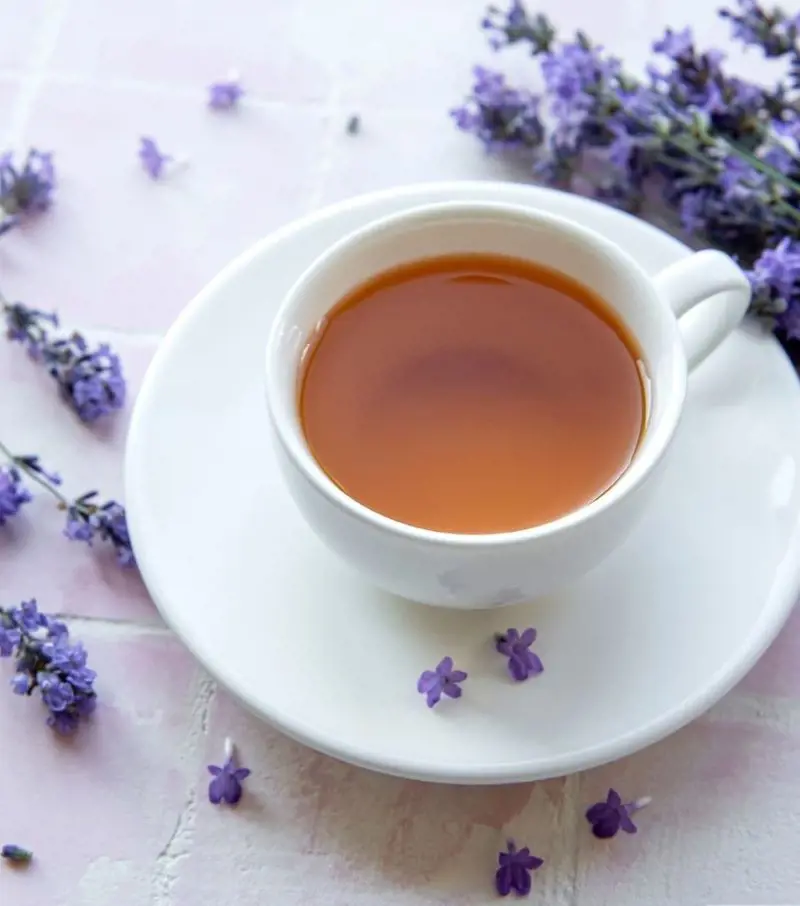
This charming purple flower is renowned globally for its unique scent and flavor, going beyond a simple floral description. Lavender, with its purple buds and irresistible taste, serves as a wonderful option for a refreshing cup of tea.
There are 47 different lavender species, primarily native to Europe and Asia but now cultivated worldwide. Lavender blossoms are harvested, dried, and then blended with loose-leaf tea and other herbal ingredients. Dried lavender is more potent than fresh, so only a small amount can add flavor to a large quantity of tea.
Health benefits:
- Soothes stress
- Improves sleep quality
- Relieves headache
- Relieves period pain
- Boosts immune system
6. Lemongrass Herbal Tea
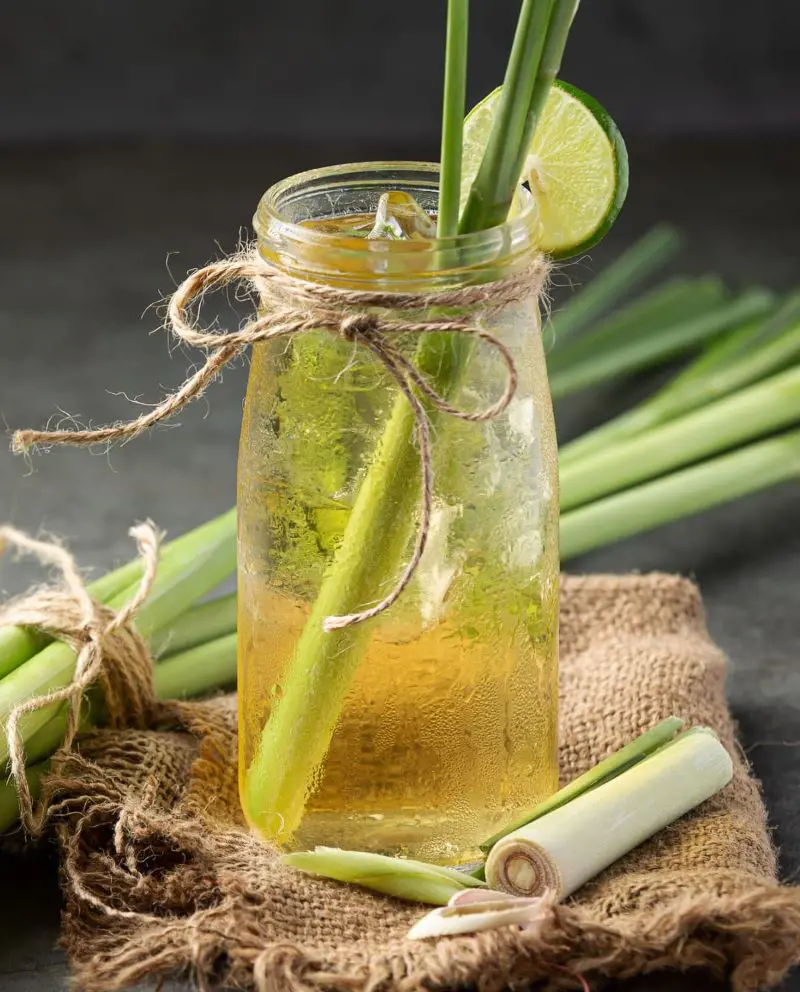
Lemongrass, despite its name, isn't related to citrus plants like lemon and orange; instead, it is a tropical grass native to Sri Lanka and South India. However, its long and slender leaves have a faint sourness and zest that resembles lemon in flavor.
It's a popular herbal tea ingredient known for its citrusy, zesty flavor, often blended with other ingredients like peppermint, ginger, and true tea from the camellia sinensis plant.
Health benefits:
- Helps lower cholesterol
- Relieves pain
- Improves oral health and prevents cavities
- Reduces bloating
- Reduces inflammation
- Supports digestion
7. Lemon Balm Herbal Tea

Lemon balm can often be confused with lemon verbena or lemongrass, but it's a different herb. It belongs to the mint family and has a light, lemony flavor. You can identify it by its stem, which has the same sharp, square edges as a mint stem.
Lemon balm is also an herbal tea that can be brewed more than once. This means you can use the same leaves to make more cups of tea after the initial infusion. Just remember not to over-consume it over an extended period.
Health benefits:
- Improves mood and mental performance
- Can be used for treating heart palpitation
- Relieves feeling of nausea
- Improves cognitive function
- Slow down an overactive thyroid
8. Rooibos Herbal Tea
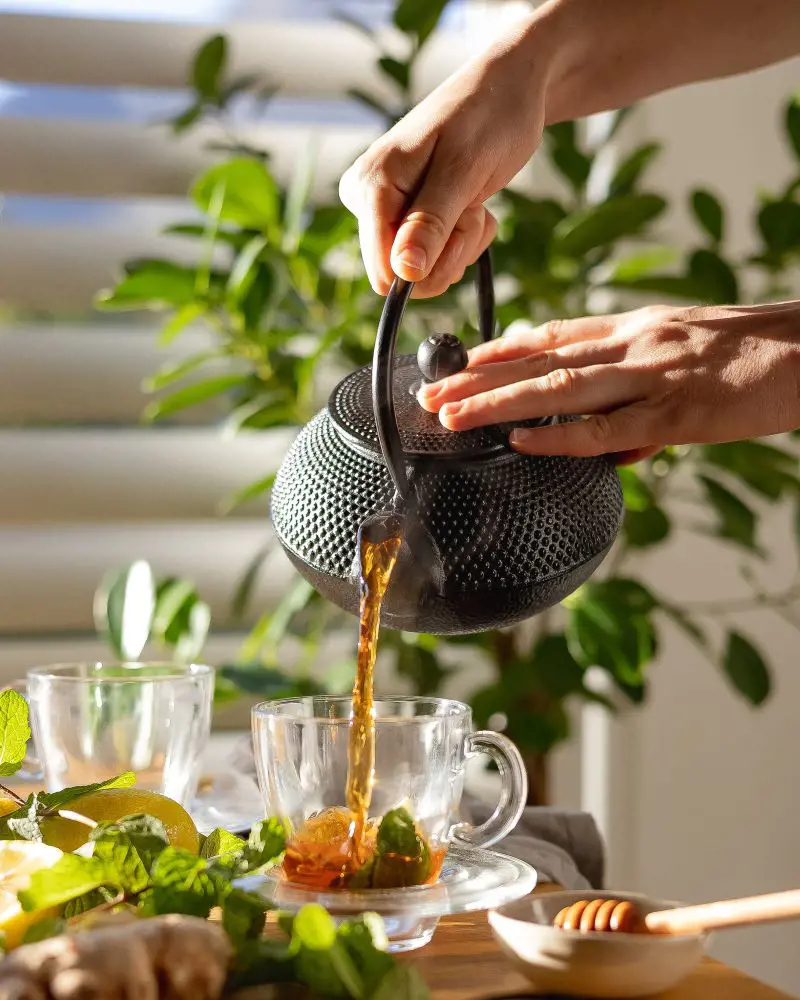
Known for its dark color and rich flavors, rooibos herbal tea is often characterized by its earthy, subtly smoky, and floral notes, which are fitting given its origin as another flower-based herbal infusion -the rooibos flower.
Rooibos is naturally caffeine-free and has a gentle, slightly sweet taste with a full body. Rooibos plants originate from South Africa, specifically the Cederberg region, where the vast majority of the world's rooibos tea is cultivated.
Health benefits:
- High in antioxidants
- Helps reduce inflammation
- May have anti-allergy effects
- Improves bone health
- May reduce heart disease risk
9. Echinacea Herbal Tea

Similar to chamomile tea, echinacea herbal tea is made from the flowers of a plant belonging to the daisy family. Echinacea flowers, found naturally in regions from the Midwest down to Texas, come in a range of hues, with the most favored shade being a light purple.
These purple blooms impart a mildly sweet flavor with floral and grassy undertones. Echinacea tea also carries a faint straw-like essence and transforms into a delightful golden-red when it is brewed.
Health benefits:
- Boosts immunity
- Prevent and treat the common cold
- Reduce pain and inflammation
- Soothes the sore throat
10. Sage Herbal Tea
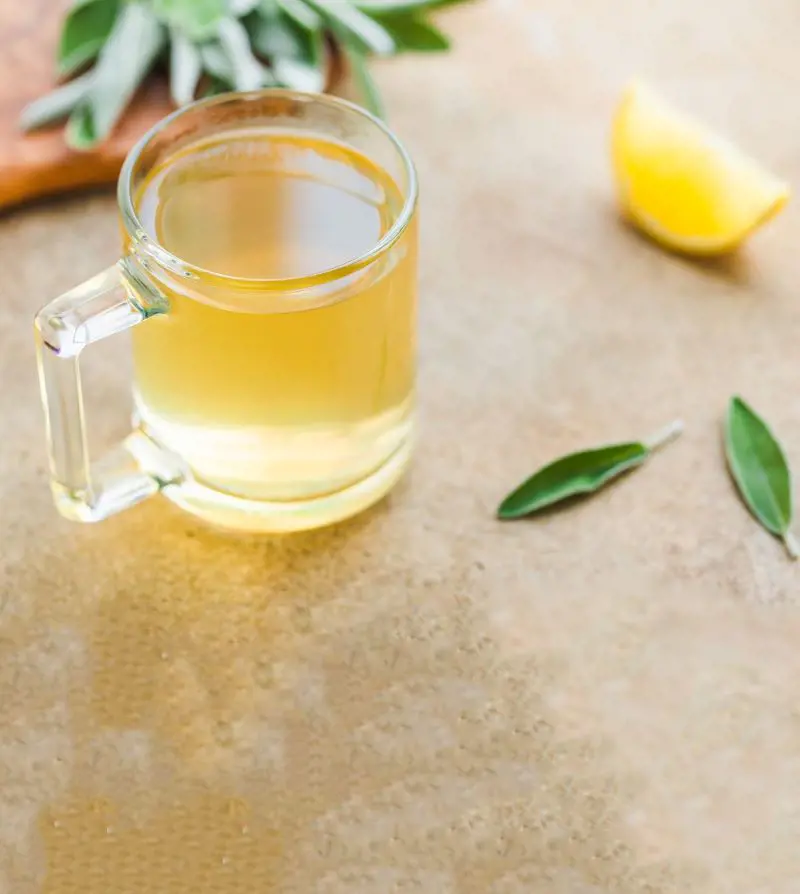
While sage is primarily known for its culinary applications, sage herbal tea is a healthy and readily accessible beverage option. It offers an earthy and slightly bitter flavor with distinct herbaceous notes, which can be complemented by a touch of honey or a slice of citrus fruit.
Health benefits:
- Good for heart health
- Improves cognitive function
- Good for mental function and memory
- Help lower LDL (bad) cholesterol levels
11. Moringa Herbal Tea
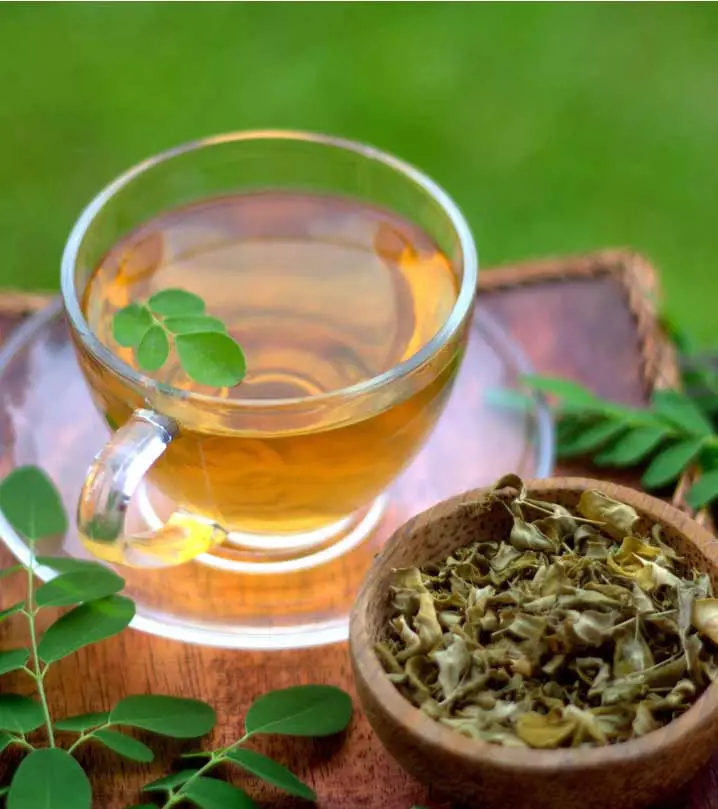
Moringa herbal tea is brewed from the leaves of the moringa plant, Moringa oleifera. While the plant's fragrant flowers are often used in perfume and skincare products, it's the leaves that are commonly steeped for tea.
This tea is rich in antioxidants, vitamins, and minerals, providing vital nutrients for health. Moringa tea boasts a fresh taste that is similar to green tea, complemented by earthy undertones.
Health benefits:
- Can combat malnutrition
- Prevent arsenic poisoning
- Reduce insulin resistance and balance blood sugar
- High in insoluble fibers
- Boost testosterone level
12. Rosehip Herbal Tea

While you can certainly make tea using rose petals and buds, another edible part of the rose plant is the rosehip, a small fruit that develops at the base of its flowers. Rosehips are excellent for making a well-balanced herbal tea that is abundant in vitamin C.
This tea has a floral essence with a subtle tart note that can refresh your senses. Beyond just vitamin C, rosehip tea contains a range of other beneficial chemical compounds that contribute to a healthy lifestyle.
Health benefits:
- Increase blood flow in the limbs
- Protect skin cells against sun damage
- Used for diarrhea, gallstone, constipation, and kidney disorder
- Protect against type 2 diabetes.
- Avert stomach irritation
13. Turmeric Herbal Tea
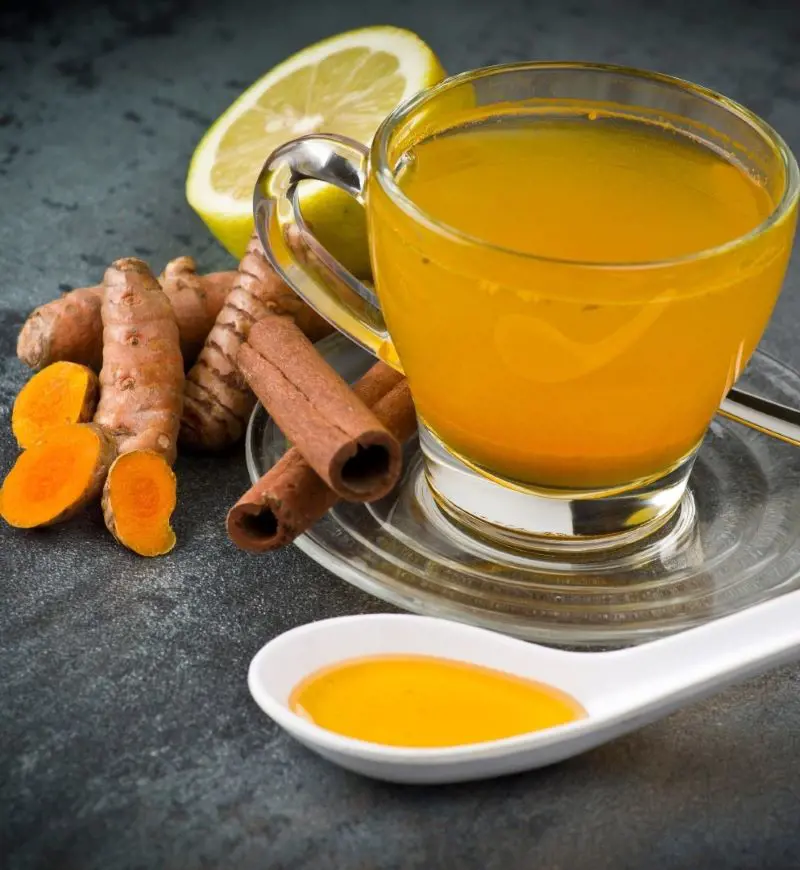
Turmeric, available in powdered, dry form or as fresh little root nubs resembling ginger, is a superfood known for its versatility. You don't have to limit yourself to adding it to smoothies to enjoy its nutritional value; you can also relish it in the form of a soothing tea.
Much like ginger, you can slice fresh turmeric into thin discs and steep them in hot water to make turmeric tea. Alternatively, you can try using the powdered form to create thicker hot beverages.
Health benefits:
- Reduce inflammation
- Powerful anti-inflammatory
- Immune system booster
- Lowers cholesterol
- Prevents heart disease
- Eases irritable bowel syndrome
14. Cinnamon Herbal Tea

Cinnamon, renowned as one of the ideal warm spices, may surprise you with its spiciness. When enjoyed in the pure form of cinnamon tea, without sugar or milk, it has the ability to open up your sinuses and deliver a subtle, yet warming sensation to the back of your throat.
Cinnamon's flavor is well-known, but it becomes milder when combined with sugar. In its pure form, cinnamon has a vibrant and earthy profile, making it an ideal choice for a comforting winter tea.
Health benefits:
- Loaded with antioxidants
- Lowers inflammation and may improve heart health
- May promote weight loss
- Fights off bacteria and fungi
- May help reduce blood sugar
- May reduce menstrual cramps and other PMS symptoms
15. Dandelion Herbal Tea
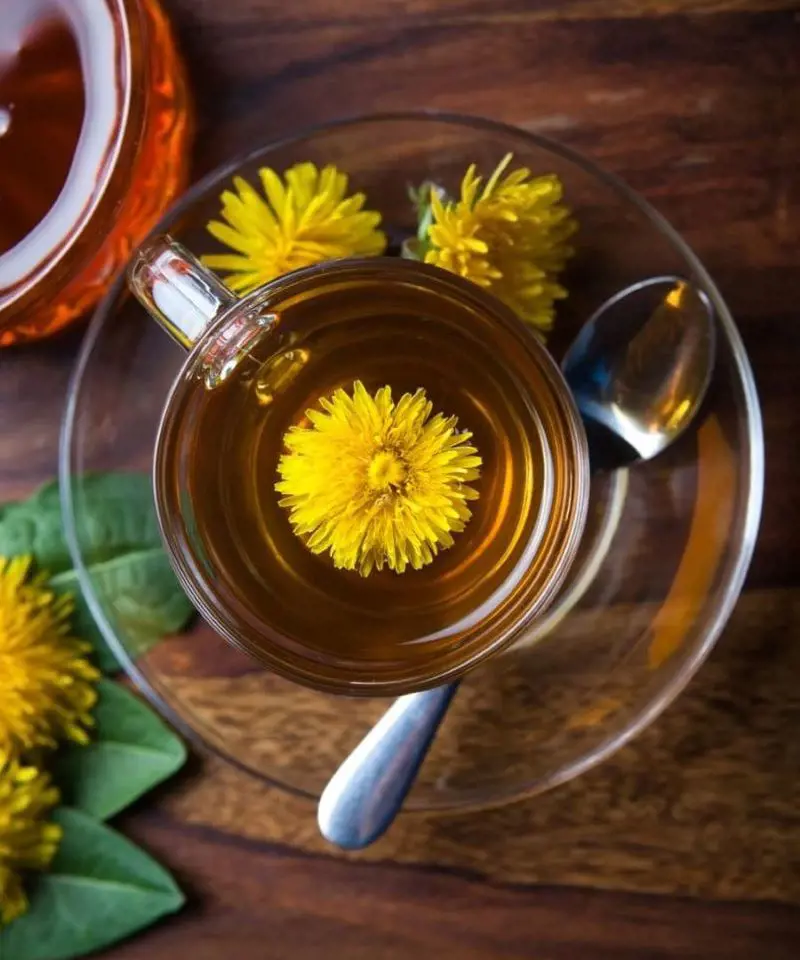
Dandelion infusions can be prepared from any part of the dandelion plant -flower, leaf, or root- all of which are edible. Dandelion root, known for its nutty roasted flavor, is frequently used in tea blends and is renowned for its role in preventing and treating various liver ailments and hepatic injuries.
As for the flower part, you have the option to either dry the blossoms so that they are shelf-stable or steep them when they are fresh and plump.
Health benefits:
- Can promote liver health
- Acts as a natural coffee substitute
- May soothe digestive ailments
- Cancer-fighting potential
- Help prevent urinary tract infections
16. Jasmine Herbal Tea
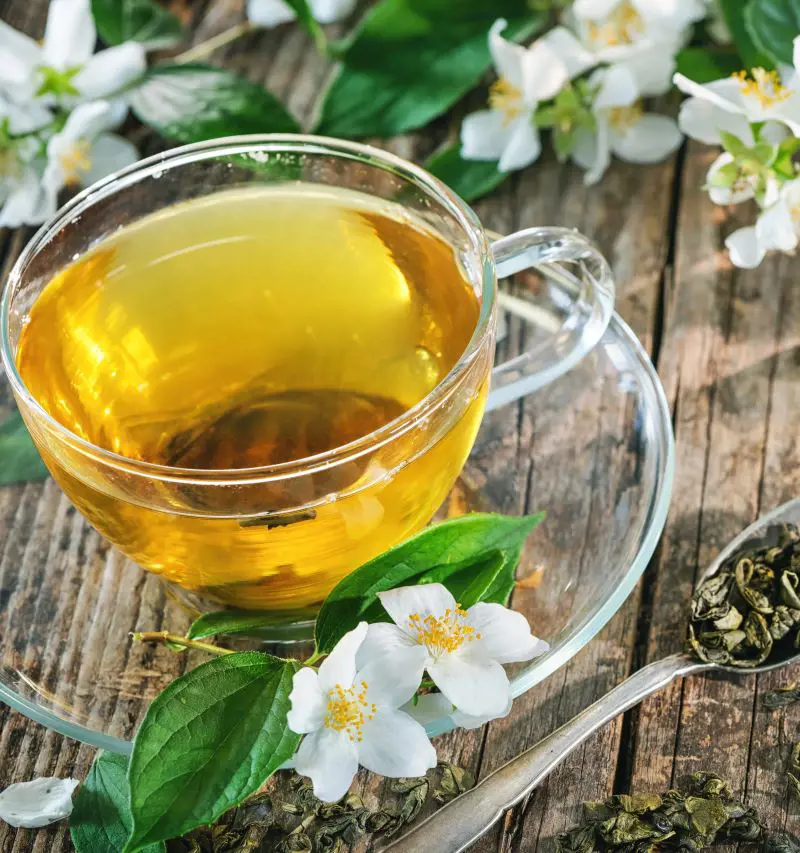
Numerous herbal teas are frequently paired with traditional, caffeinated tea varieties, and jasmine serves as a great example by being commonly enjoyed alongside green tea. Nevertheless, jasmine-only teas are also available and are known for their refreshing flavor.
The jasmine plant has small white flowers which have a profoundly aromatic fragrance. These blossoms are the key to jasmine tea, which is enjoyed worldwide, whether served hot or refreshingly chilled.
Health benefits:
- Relieves pain
- Boosts immune system and brings mental clarity
- Reduces inflammation
- Aids in digestion
- High in antioxidants
17. Raspberry Leaf Herbal Tea
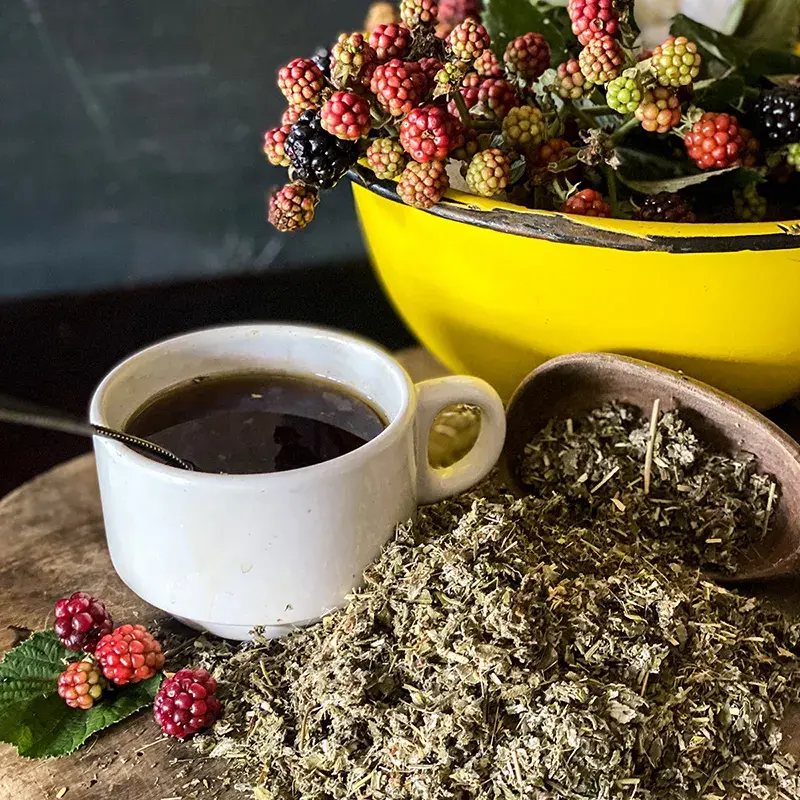
Raspberry leaf tea is one of the widely favored herbal tea, especially among pregnant women. Although there's no scientific proof, many people believe that raspberry leaf tea can provide benefits during pregnancy, ease menstrual cramps, and potentially shorten the duration of labor.
However, it is crucial to note that if you are pregnant or could potentially become pregnant, it is advisable to consult with your doctor before adding any herbal teas into your routine.
Health benefits:
- Rich in antioxidants
- Ease symptoms of premenstrual syndrome
- Benefits during pregnancy
- Reduce interventions and complications of childbirth
18. Passionflower Herbal Tea
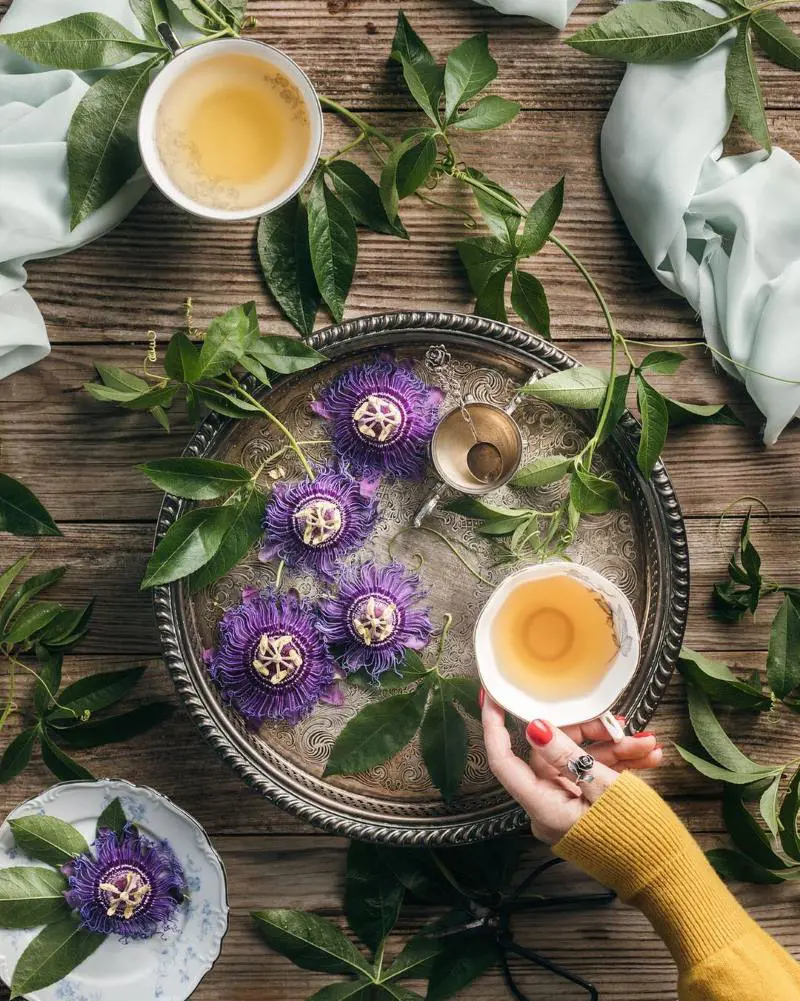
Passionflower tea offers a delicate blend of floral, grassy, and earthy flavors. While it's most often combined with other herbal tea leaves and flowers, you can still find pure passionflower tea options.
One of the primary benefits of consuming passionflower tea is its sedative properties and its ability to enhance sleep quality, similar to the soothing effects of chamomile and valerian.
Health benefits:
- Enhanced sleep quality and duration
- May calm your mind
- Soothe your stomach
- Lessened instances of anxiety and depression
- Preventative wellness benefits for neurological health
19. Licorice Root Herbal Tea

Whether or not you're a fan of its distinct taste, licorice root tea offers exceptional health benefits. If you have a very sweet tooth, it could be an ideal choice for you. Brewing licorice root creates a very intense infusion with an aniseed flavor.
Its unique blend of minty, spicy, and anise-like savor makes licorice root tea a delightful choice, especially when enjoyed with something sweet and buttery to balance out the strong licorice essence.
Health benefits:
- Soothes sore throats
- Wards off colds
- Anti-inflammatory properties
- Soothes upset stomachs
- Good for your teeth
- Boosts immune system
20. Peppermint Herbal Tea
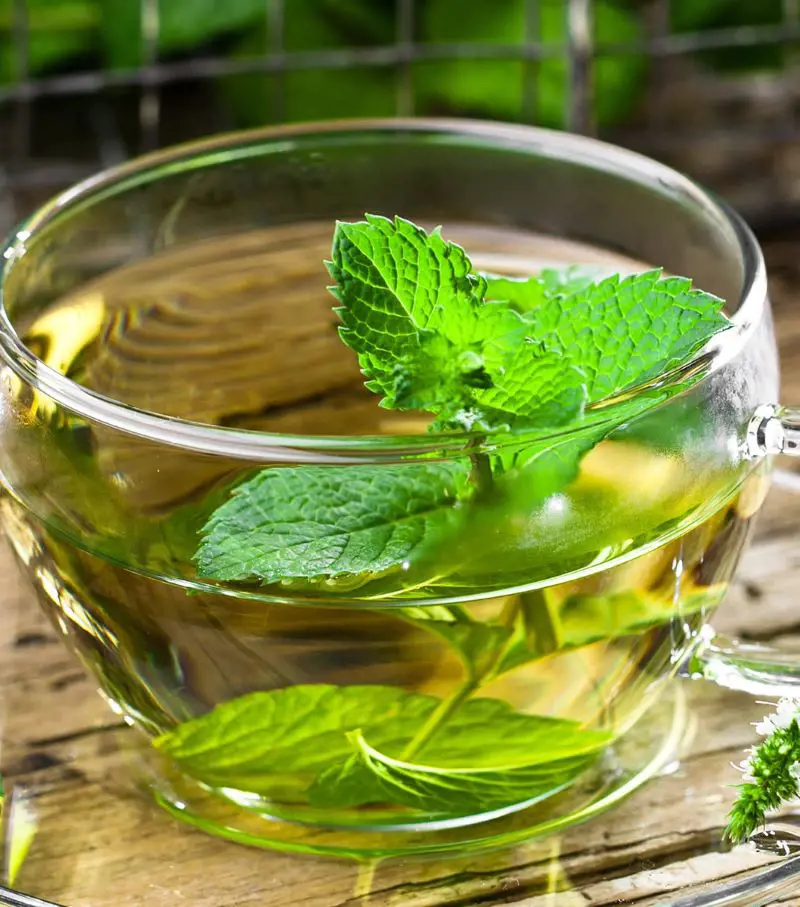
Peppermint stands as a beloved herbal tea that can be enjoyed on its own as a soothing herbal infusion or mixed with various herbal and caffeinated blends. It has a long history of being used as a remedy for various health issues such as upset stomachs and colds.
Upon brewing, the leaves also impart a natural sweetness that complements the renowned minty freshness of this multipurpose tea.
Health benefits:
- Relaxes your muscles and provides restful sleep
- Works as a mouth freshener
- May relieve menstrual cramps
- Relieve tension, headache, and migraine
- Help with digestion
21. Tulsi Herbal Tea
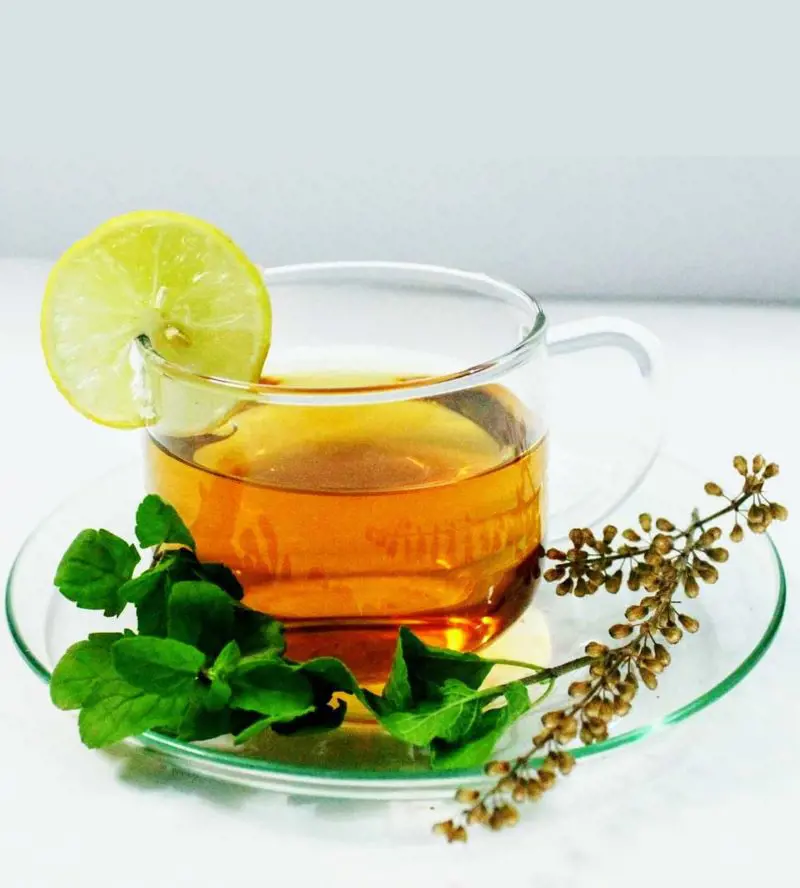
Tulsi tea, also known as holy basil tea, is made from the leaves of the holy basil plant. It is renowned for its exceptional health benefits. This tea has a subtle basil flavor, with strong astringent undertones, which can vary depending on the steeping duration.
Tulsi tea holds a distinguished place among India's most significant teas due to its potent healing properties. Tulsi is one of the key herbs used in Ayurvedic medicine.
Health benefits:
- Enhance immunity
- Helps maintain the cortisol hormone level
- Reduces stress and anxiety
- Strengthen the kidney
- Support heart health and bone mineralization
- Uplifts mind and mood
22. Valerian Root Herbal Tea
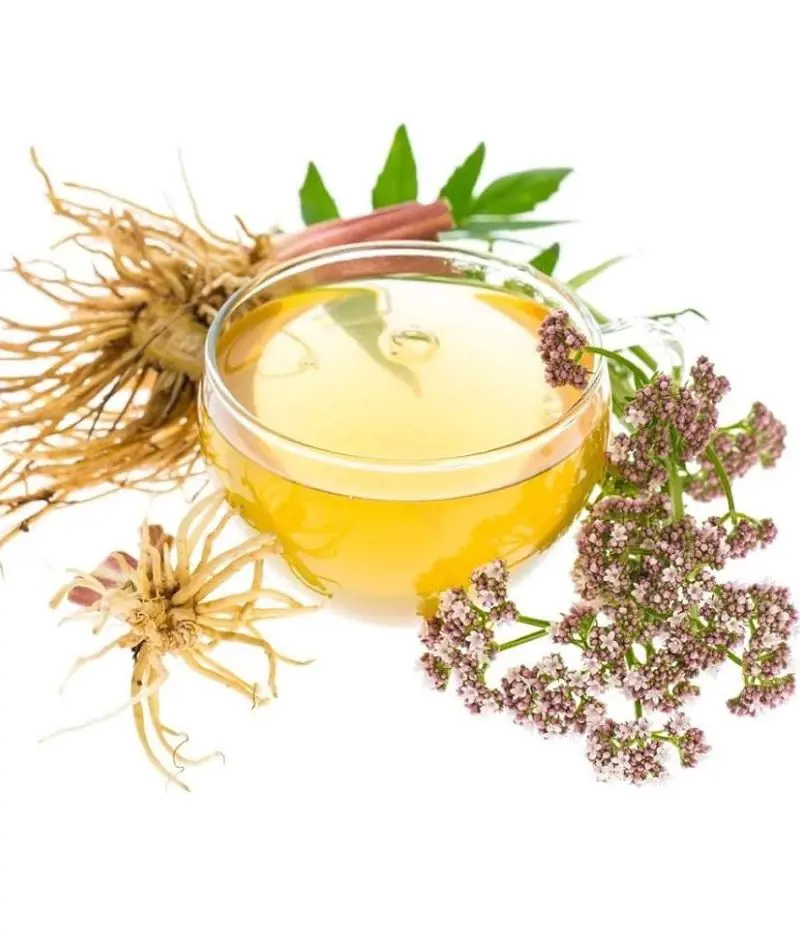
In addition to chamomile and passionflower, valerian is a popular herbal tea known for enhancing both the quality and duration of sleep. Multiple studies have indicated that valerian could serve as a natural remedy for promoting sleep without adverse side effects; however, further research is still needed.
As for the flavor, valerian root tea offers a distinctly woody taste with subtle hints of citrus and pine. It's worth noting that valerian tea is not typically chosen for its flavor.
Health benefits:
- Improve sleep quality
- Reduce anxiety
- Reduce hyperactive behavior in children
- Improve symptoms of OCD
23. Butterfly Pea Flower Herbal Tea

Often referred to as blue tea, butterfly pea flower tea is made from the leaves and flower petals of the clitoria ternatea plant, commonly cultivated in Southeast Asia. When steeped as a tea, butterfly pea flower unfolds a striking shade of blue.
It has a floral and subtle sweetness, reminiscent of chamomile. This versatile tea can be incorporated into various beverages and even cocktails to infuse them with a vibrant burst of blue color.
Health benefits:
- Reduces inflammation
- Soothes fever symptoms
- Help reduce symptoms of anxiety
- Bolster energy levels and stamina
- Influence positive emotions
Recent posts
Nutrition
Nutrition
Liquorice Root: Benefits And Uses
You can spell it liquorice or licorice; this herb or root has been in use for centuries in most medicinal applications, as a natural sweetener and to enhance flavors. Regarding its origins, it comes from the root of the "Glycyrrhiza galbre" plant and...
Nutrition
Is Ramen Healthy? Here's What Dietician Says
Ramen is a traditional dish from Japan that in the recent era has become a global phenomenon. This beloved and comforting soupy dish however has been questioned, when it comes to its nutrition. Best for those looking for a quick (instant), affo...
Nutrition
Is Wheat Bread Healthy? An Expert Picks
Wheat bread has been proudly celebrated as a dietary staple in countless homes for as long as people can remember. It has earned a reputation as a healthier alternative to white or any other processed bread, that no one can deny. Because of its evide...
Nutrition
Is Sausages Healthy? Nutrition And Health Benefits
Sausages are tasty in an addictive way, making them one of the most popular foods worldwide. You may have enjoyed this convenient food often, whether on a bun with mustard or grilled on a barbecue, the simple preparation methods are what makes its co...
Nutrition
Ice Cream Benefits: Nutrition, Potential Risks And Best Choices
Not gonna lie, ice cream is often taken as a guilty pleasure treat, a delightful treat that takes you to cloud nine but is frequently associated with negative health implications. Nonetheless, the happy news is when devoured mindfully, ice cream can ...
Nutrition
Is Sushi Healthy? Some Good and Bad Choices
Sushi is a wholesome meal and a beloved Japanese dish. The traditional sushi recipe is a simple combination of fresh fish, vegetables, and vinegared rice which is popular for its minimalistic preparation. As with any food, there are factors that dete...







